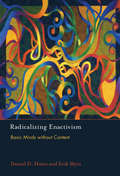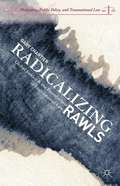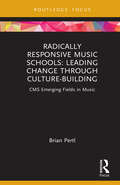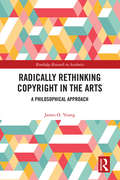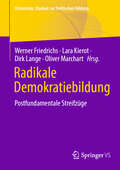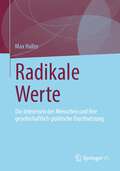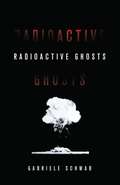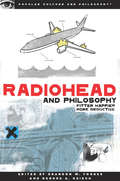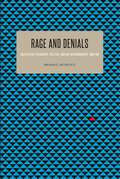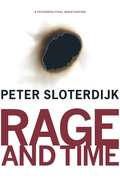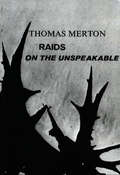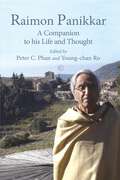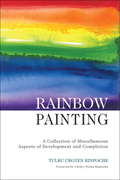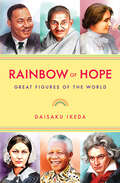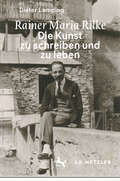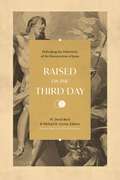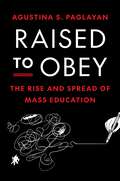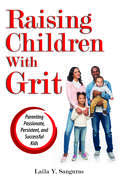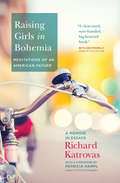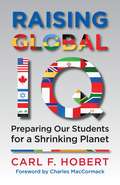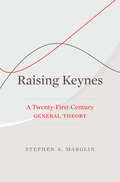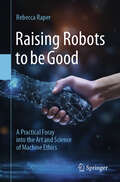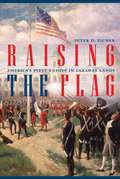- Table View
- List View
Radicalizing Enactivism: Basic Minds without Content
by Daniel D. Hutto Erik MyinA book that promotes the thesis that basic forms of mentality—intentionally directed cognition and perceptual experience—are best understood as embodied yet contentless.Most of what humans do and experience is best understood in terms of dynamically unfolding interactions with the environment. Many philosophers and cognitive scientists now acknowledge the critical importance of situated, environment-involving embodied engagements as a means of understanding basic minds—including basic forms of human mentality. Yet many of these same theorists hold fast to the view that basic minds are necessarily or essentially contentful—that they represent conditions the world might be in. In this book, Daniel Hutto and Erik Myin promote the cause of a radically enactive, embodied approach to cognition that holds that some kinds of minds—basic minds—are neither best explained by processes involving the manipulation of contents nor inherently contentful. Hutto and Myin oppose the widely endorsed thesis that cognition always and everywhere involves content. They defend the counter-thesis that there can be intentionality and phenomenal experience without content, and demonstrate the advantages of their approach for thinking about scaffolded minds and consciousness.
Radicalizing Rawls: Global Justice and the Foundations of International Law
by Gary ChartierThis book is a critical examination of John Rawls's account of the normative grounds of international law, arguing that Rawls unjustifiably treats groups - rather than particular persons - as foundational to his model of international justice.
Radically Responsive Music Schools: Leading Change through Culture-Building (CMS Emerging Fields in Music)
by Brian PertlRadically Responsive Music Schools is a philosophical reimagining of music higher education culture from the ground up, arguing that holistic cultural change is the key factor needed for music schools to prepare 21st-century graduates for contemporary challenges.The author discusses how university and conservatory music programs can incorporate traits they seek to foster in their students – creativity, innovation, improvisation, and entrepreneurial thinking – into the institutions themselves. Through Deep Listening exercises, thought experiments, and other activities, Pertl provides detailed scaffolding for creating music school cultures of belonging and collaboration, wellbeing and intention, curiosity and wonder, creativity and improvisation, and playfulness and joy. Unpacking the complexities of transforming institutional culture, this book envisions the modern school of music as agile, collaborative, and socially aware and outlines pathways for leaders to realize this vision.Radically Responsive Music Schools is an essential resource for college-level music education administrators, professors, students, or staff members interested in how institutional culture can act as a catalyst for radical change in music programs.
Radically Rethinking Copyright in the Arts: A Philosophical Approach (Routledge Research in Aesthetics)
by James O. YoungThis book radically rethinks the philosophical basis of copyright in the arts. The author reflects on the ontology of art to argue that current copyright laws cannot be justified. The book begins by identifying two problems that result from current copyright laws: (1) creativity is restricted and (2) they primarily serve the interests of large corporations over those of the artists and general public. Against this background, the author presents an account of the ontology of artworks and explains what metaphysics can tell us about ownership in the arts. Next, he makes a moral argument that copyright terms should be shorter and that corporations should not own copyrights. The remaining chapters tackle questions regarding the appropriation of tokens of artworks, pattern types, and artistic elements. The result is a sweeping reinterpretation of copyright in the arts that rests on sound ontological and moral foundations. Radically Rethinking Copyright in the Arts will be of interest to scholars and advanced students working in aesthetics and philosophy of art, metaphysics, philosophy of law, and intellectual property law.
Radikale Demokratiebildung: Postfundamentale Streifzüge (Citizenship. Studien zur Politischen Bildung)
by Dirk Lange Oliver Marchart Werner Friedrichs Lara KierotDie Kulmination von Krisen zu Beginn des 3. Jahrtausends – Klimakrise, Verteilungskrise, Gesundheitskrise, Ernährungskrise, Trinkwasserkrise, Finanzkrise etc. – macht es unmöglich, unsere Situation ausschließlich in Figurationen lokaler oder zeitlich abgrenzbarer Probleme oder Herausforderungen zu erfassen, sondern wirft fundamentale Fragen auf. Allen voran die Frage, in welcher Welt wir zukünftig leben wollen. Für die demokratische Praxis, wie auch für demokratisches Denken, erwächst daraus eine kaum zu überschätzende Aufgabe: Die Reformulierung des Rahmens eines gemeinsamen, demokratischen Erfahrungshorizontes, eines demokratischen, (mit-)geteilten Weltzugangs. Dabei zeigt sich, dass vor allem die Blaupausen liberaler Demokratieansätze selbst in eine Krise geraten sind und ihre Orientierungskraft eingebüßt haben. In diesem Sammelband wird eine offene Suche einer Konzeption Radikaler Demokratiebildung gesucht, mit der es möglich werden könnte, den Herausforderungen der Gegenwart zu begegnen.
Radikale Werte: Die Interessen der Menschen und ihre gesellschaftlich-politische Durchsetzung
by Max HallerEin berühmter, immer wieder zitierter Satz von Max lautet: „Interessen (materielle und ideelle), nicht: Ideen, beherrschen unmittelbar das Handeln der Menschen. Aber: die ‚Weltbilder‘, welche durch ‚Ideen‘ geschaffen wurden, haben sehr oft als Weichensteller die Bahnen bestimmt, in denen die Dynamik der Interessen das Handeln fortbewegte.“ Die neuere Soziologie ist diesem Grundsatz allerdings nicht gerecht geworden. Werte und ihre Wirkung werden entweder als gegeben vorausgesetzt (so bei Talcott Parsons) oder überhaupt als irrelevant betrachtet (so in der Rational Choice- und Systemtheorie). Die umfangreiche, empirische Werteforschung hat vielfältige Ergebnisse erbracht, blieb jedoch weitgehend ohne theoretisches Fundament, sodass ihre Befunde vielfach anfechtbar sind. Weber selbst gab im Hinblick auf die Frage nach der Relevanz der Werte nur unbefriedigende Antworten: Die Entscheidung für bestimmte Werte sei eine rein individuelle Angelegenheit und zwischen den verschiedenenWerten gebe es einen unversöhnlichen Kampf. Im vorliegenden Buch wird diese Problematik erstmals in der deutschen Soziologie umfassend untersucht und es wird dafür (u.a. im Anschluss an Autoren wie Immanuel Kant, George H. Mead und Raymond Boudon), eine neue, konstruktive und erklärungsstarke Lösung gefunden. Unter Zuhilfenahme von Überlegungen aus Philosophie, Sozialtheorie und empirischer Sozialforschung sowie unter Einbeziehung historischer Kämpfe zur Anerkennung und Durchsetzung der Werte kann man feststellen, dass es gesellschaftliche Grundwerte gibt, dass deren Anzahl klar bestimmbar ist und dass zwischen ihnen keineswegs Konflikt, sondern Komplementarität besteht. Mit diesen Thesen und Befunden kann dieses Buch als neues soziologisches Standardwerk angesehen werden. Es hat auch für Vertreter vieler anderer geistes- und sozialwissenschaftlicher Disziplinen grundlegende Bedeutung.
Radio Benjamin
by Walter Benjamin Jonathan Lutes Lecia RosenthalWalter Benjamin was fascinated by the impact of new technology on culture, an interest that extended beyond his renowned critical essays. From 1927 to '33, he wrote and presented something in the region of eighty broadcasts using the new medium of radio. Radio Benjamin gathers the surviving transcripts, which appear here for the first time in English. This eclectic collection demonstrates the range of Benjamin's thinking and his enthusiasm for popular sensibilities. His celebrated "Enlightenment for Children" youth programs, his plays, readings, book reviews, and fiction reveal Benjamin in a creative, rather than critical, mode. They flesh out ideas elucidated in his essays, some of which are also represented here, where they cover topics as varied as getting a raise and the history of natural disasters, subjects chosen for broad appeal and examined with passion and acuity.Delightful and incisive, this is Walter Benjamin channeling his sophisticated thinking to a wide audience, allowing us to benefit from a new voice for one of the twentieth century's most respected thinkers.From the Hardcover edition.
Radioactive Ghosts (Posthumanities #61)
by Gabriele SchwabA pioneering examination of nuclear trauma, the continuing and new nuclear peril, and the subjectivities they generate Amid resurgent calls for widespread nuclear energy and &“limited nuclear war,&” the populations that must live with the consequences of these decisions are increasingly insecure. The nuclear peril combined with the looming threat of climate change means that we are seeing the formation of a new kind of subjectivity: humans who are in a position of perpetual ontological insecurity. In Radioactive Ghosts, Gabriele Schwab articulates a vision of these &“nuclear subjectivities&” that we all live with. Focusing on the legacies of the Manhattan Project, Hiroshima, and nuclear energy politics, Radioactive Ghosts takes us on a tour of the little-seen sides of our nuclear world. Examining devastating uranium mining on Native lands, nuclear sacrifice zones, the catastrophic accidents at Chernobyl and Fukushima, and the formation of a new transspecies ethics, Schwab shows how individuals threatened with extinction are creating new adaptations, defenses, and communal spaces. Ranging from personal accounts of experiences with radiation to in-depth readings of literature, film, art, and scholarly works, Schwab gives us a complex, idiosyncratic, and personal analysis of one of the most overlooked issues of our time.
Radiohead and Philosophy
by George A. Reisch Brandon W. ForbesSince their breakthrough hit "Creep" in 1993, Radiohead has continued to make waves throughout popular and political culture with its views about the Bush presidency (its 2003 album was titled Hail to the Thief), its anti-corporatism, its pioneering efforts to produce ecologically sound road tours, and, most of all, its decision in 2007 to sell its latest album, In Rainbows, online with a controversial "pay-what-you-want" price. Radiohead and Philosophy offers fresh ways to appreciate the lyrics, music, and conceptual ground of this highly innovative band. The chapters in this book explain how Radiohead's music connects directly to the philosophical phenomenology of thinkers like Maurice Merleau-Ponty and Martin Heidegger, the existentialism of Albert Camus and Jean Paul Sartre, and the philosophical politics of Karl Marx, Jean Baudrillard, and Noam Chomsky. Fans and critics know that Radiohead is "the only band that matters" on the scene today - Radiohead and Philosophy shows why.
Rage and Denials: Collectivist Philosophy, Politics, and Art Historiography, 1890–1947
by Branko MitrovićIn Rage and Denials, philosopher and architectural historian Branko Mitrović examines in detail the historiography of art and architecture in the twentieth century, with a focus on the debate between the understanding of society as a set of individuals and the understanding of individuals as mere manifestations of the collectives to which they belong. The conflict between these two views constitutes a core methodological problem of the philosophy of history and was intensely debated by twentieth-century art historians—one of the few art-historical debates with a wide range of implications for the entire field of the humanities. Mitrović presents the most significant positions and arguments in this dispute as they were articulated in the art- and architectural-historical discourse as well as in the wider context of the historiography and philosophy of history of the era. He explores the philosophical content of scholarship engaged in these debates, examining the authors’ positions, the intricacies and implications of their arguments, and the rise and dominance of collectivist art historiography after the 1890s. He centers his study on the key art-historical figures Erwin Panofsky, Ernst Gombrich, and Hans Sedlmayr while drawing attention to the writings of the less well known Vasiliy Pavlovich Zubov. Rage and Denials offers a valuable window onto how key aspects of modern research in the humanities took shape over the course of the twentieth century.
Rage and Time: A Psychopolitical Investigation (Insurrections: Critical Studies in Religion, Politics, and Culture)
by Peter SloterdijkWhile ancient civilizations worshipped strong, active emotions, modern societies have favored more peaceful attitudes, especially within the democratic process. We have largely forgotten the struggle to make use of thymos, the part of the soul that, following Plato, contains spirit, pride, and indignation. Rather, Christianity and psychoanalysis have promoted mutual understanding to overcome conflict. Through unique examples, Peter Sloterdijk, the preeminent posthumanist, argues exactly the opposite, showing how the history of Western civilization can be read as a suppression and return of rage. By way of reinterpreting the Iliad, Alexandre Dumas's Count of Monte Cristo, and recent Islamic political riots in Paris, Sloterdijk proves the fallacy that rage is an emotion capable of control. Global terrorism and economic frustrations have rendered strong emotions visibly resurgent, and the consequences of violent outbursts will determine international relations for decades to come. To better respond to rage and its complexity, Sloterdijk daringly breaks with entrenched dogma and contructs a new theory for confronting conflict. His approach acknowledges and respects the proper place of rage and channels it into productive political struggle.
Raids on the Unspeakable
by Thomas MertonThis collection of his prose writings reveals the extent to which Thomas Merton moved from the other-worldly devotion of his earlier work to a direct, deeply engaged, often militant concern with the critical situation of man in the world. Here this concern finds expression in poetic irony and in meditations intentionally dour. In these brief, challenging pieces, Father Merton does not offer consolation or easy remedies. He looks candidly and without illusions at the world of his time. Though he sees dark horizons, his ultimate answer is one of Christian hope. To vary the perspective, he writes in many forms, using parable and myth, the essay and the meditation, satire and manifesto, prose poetry and even adaptations from a medieval Arab mystic (Ibn Abbad) to humanize and dramatic his philosophical themes. The themes of Raids on the Unspeakable are as old as the myths of Prometheus and Atlas, and as timely as the human evils of today. They range from the "Message" written for an international congress of poets to the beautiful yet disturbing Christmas meditation, "The Time of the End Is the Time of No Room." And there are essays inspired by the world of three significant contemporary writers: Flannery O'Connor, the French novelist Julien Green, and the playwright Eugene Ionesco. A number of Father Merton's own drawings are also included in the book--not as "illustrations," but as "signatures" or :"abstract writings," which stand in their own right as another personal statement.
Raimon Panikkar: A Companion to his Life and Thought
by Peter C. Phan Young-Chan RoRaimon Panikkar: A Companion to his Life and Thought is a guide to the life, work and thought of Raimon Panikkar, a self-professed Buddhist-Christian-Hindu philosopher and theologian. A man of deep and wide learning and an extremely prolific author, Panikkar is equally at home in various religious and cultural traditions and embodies in himself the ideals of intercultural, intrareligious, and interreligious dialogues. This book explicates Panikkar's basic vision of life as the harmonious rhythm of divinity, humanity, and the cosmos, which he terms cosmotheandrism, and shows how it permeates and illumines his articulations of the central Christian doctrines. Given the complexity and difficulty of Panikkar's thought this book is a welcome companion for a course on Panikkar and for a general reader who wishes to understand one of the most profound and orginal thinkers of our time.
Rainbow Painting
by Erik Pema Kunsang Marcia Binder Schmidt Tulku Urgyen Rinpoche Kerry MoranRainbow Painting is saturated with direct, pithy instruction, the very quintessence of the Buddhist Spiritual approach. Tulku Urgyen Rinpoche speaks from experience, expressing what he himself has undergone, instructing us in the way we should train in a complete and unmistaken manner. We come to understand that to become enlightened we must experience what was always present within us. The ultimate object of realization, the natural state of mind, unmistakenly and exactly as it is, need not be sought for elsewhere but is present within ourselves. Stability in this unexcelled state of unity is not attained independently of means, proper conduct and knowledge of the view. We should unite view and conduct; and this book contains the key points for doing just that."Some people have the habit of thinking that something is bound to happen after practicing meditation a while - like going through school - that after ten or fifteen years you end up with a degree. That's the idea in the back of people's minds: "I can make it happen! I can do enlight¬enment!" Not in this case, though. You cannot make enlightenment, because enlightenment is unconstructed. Realizing the awakened state is a matter of being diligent in allowing nondual awareness to regain its natural stability. It is difficult to reach enlightenment without such dili¬gence, without undertaking any hardship."---Tulku Urgyen Rinpoche"Tulku Urgyen Rinpoche is someone who has lived at length in mountain hermitages, spent many years in retreat, and done a considerable amount of meditation training. For this reason, he gives the very quintessence of the sacred Dharma spoken by our compassionate Buddha Shakyamuni. He speaks from experience, expressing what he himself has undergone, instructing us in the way we should practice in a complete and unmistaken manner. These teachings, saturated with direct, pithy instruction, are unique."---Chökyi Nyima RinpocheThe ultimate object of realization, the natural state of mind, unmistakenly and exactly as it is, need not be sought elsewhere than in ourselves. We become enlightened through experiencing what is always innately present. Stability in this unexcelled unawareness is attained when view, the knowledge aspect and conduct, the means are integrated. In Rainbow Painting, Tulku Urgyen Rinpoche presents the practices to accomplish this unity.
Rainbow Painting: A Collection of Miscellaneous Aspects of Development and Completion
by Erik Pema Kunsang Tulku Urgyen Chokyi NyimaSaturated with direct, pithy instructions, Rainbow Painting presents the very quintessence of the Buddhist Spiritual approach through the authentic personal experience of one of the greatest living meditation masters.Tulku Urgyen Rinpoche expresses what he himself has undergone, instructing us in a complete manner of training. To attain enlightenment we must experience our innate nature. The ultimate object of realization, the natural state of mind, unmistakenly and exactly as it is, need not be sought for elsewhere but is present within ourselves. Stability in this unexcelled state of unity is not achieved by separating what we know from what we do.This book contains astute instructions that address these key points of spirituality.From the Trade Paperback edition.
Rainbow of Hope: Great Figures of the World
by Daisaku Ikeda"No rain, no rainbows." Good things come when you win over obstacles. And great people all over the world have faced and overcome all kinds of hardships. No rain or storm could defeat them because rainbows of hope always shone in their hearts. In these delightful essays world-renowned Buddhist philosopher, educator, and peace activist Daisaku Ikeda speaks to children of his hopes for their future and offers lessons he's learned about these great people from East and West.
Rainer Maria Rilke: Die Kunst zu schreiben und zu leben
by Dieter LampingRilke ist auch ein Jahrhundert nach seinem Tod noch eine unverwechselbare Gestalt: durch seine ebenso kunstvolle wie kühne Art zu schreiben, die ihn zu einem der großen Autoren des frühen 20. Jahrhunderts gemacht hat, und durch seinen Versuch, ‚künstlerisch zu leben&‘, der ihn großen Spannungen vor allem zwischen seiner literarischen und seiner sozialen Existenz aussetzte. In seiner Lyrik wie in seiner Prosa hat dieser Lebensentwurf Rilkes samt seinem Selbstverständnis als Dichter durchgängig Spuren hinterlassen.
Raised on the Third Day: Defending the Historicity of the Resurrection of Jesus
by Michael R. Licona W. David BeckDid Jesus rise from the dead? Is resurrection even possible? There are numerous historical and philosophical challenges to belief in Jesus' resurrection. For many, these questions are insurmountable. Raised on the Third Day approaches these questions with critical and believing eyes. Edited by W. David Beck and Michael R. Licona, Raised on the Third Day collects essays from prominent contributors in the fields of philosophy, history, and apologetics. Contributors--including J. P. Moreland, William Lane Craig, Craig A. Evans, Beth M. Sheppard, and Sean McDowell--evaluate scriptural, historical, moral, and apologetic issues related to Christ's death and resurrection. Essays on the Shroud of Turin and near-death experiences round out the volume. Inspired by the foundational work of Gary Habermas--arguably the greatest contemporary Christian thinker on the resurrection--these essays build upon his work and move the discussion forward. Readers will better appreciate how Habermas has shaped scholarship on Christ's resurrection and further areas for exploration and discussion.
Raised to Obey: The Rise and Spread of Mass Education (The Princeton Economic History of the Western World)
by Agustina PaglayanHow the expansion of primary education in the West emerged not from democratic ideals but from the state&’s desire to control its citizensNearly every country today has universal primary education. But why did governments in the West decide to provide education to all children in the first place? In Raised to Obey, Agustina Paglayan offers an unsettling answer. The introduction of broadly accessible primary education was not mainly a response to industrialization, or fueled by democratic ideals, or even aimed at eradicating illiteracy or improving skills. It was motivated instead by elites&’ fear of the masses—and the desire to turn the &“savage,&” &“unruly,&” and &“morally flawed&” children of the lower classes into well-behaved future citizens who would obey the state and its laws.Drawing on unparalleled evidence from two centuries of education provision in Europe and the Americas, and deploying rich data that capture the expansion of primary education and its characteristics, this sweeping book offers a political history of primary schools that is both broad and deep. Paglayan shows that governments invested in primary schools when internal threats heightened political elites&’ anxiety around mass violence and the breakdown of social order.Two hundred years later, the original objective of disciplining children remains at the core of how most public schools around the world operate. The future of education systems—and their ability to reduce poverty and inequality—hinges on our ability to understand and come to terms with this troubling history.
Raising Children With Grit: Parenting Passionate, Persistent, and Successful Kids
by Laila SangurasGrit, the combination of passion and perseverance, has more of an influence on success than cognitive ability, and parents want nothing more than to raise happy, successful children. Raising Children With Grit: Parenting Passionate, Persistent, and Successful Kids provides the strategies that parents need to teach, motivate, and inspire children to pursue their passions with grit—and succeed. By focusing on self-discipline, parenting strategies, and personality traits, parents can cultivate perseverance in their children. By coupling that with an emphasis on curiosity and interest-building activities, parents can help their children define their passions. Additionally, this book offers tips for parents about working with school personnel, how to model grit in their own lives, and how social factors can influence the development of grit.
Raising Girls in Bohemia
by Richard KatrovasA provocative collection of personal and political essays by an American writer, Raising Girls in Bohemia chronicles the life of a father raising three perfectly bilingual, culturally bifurcated, Czech-American daughters. While tracing what fatherhood has taught him about the world, Katrovas delves into a range of intricately related yet far-flung subjects including fine dining, sexual epithets, gender identity, racism, poetry, and education, tracing the contours of his ignorance about all things. Through the course of these fine essays, Katrovas unveils what it means to be an American and to be a man, and especially what it means to be a father of three daughters, born in Prague, in what we can only hope is the twilight of patriarchy.
Raising Global IQ: Preparing Our Students for a Shrinking Planet
by Carl HobertA groundbreaking roadmap for improving global literacy and conflict-resolution skills in middle and high schools across the United States In Raising Global IQ, Carl Hobert calls on K-12 teachers, administrators, parents, and students alike to transform the educational system by giving students the tools they need to become responsible citizens in a shrinking, increasingly interdependent world. Drawing on his nearly thirty years teaching, developing curricula, and leading conflict-resolution workshops here and around the world, he offers creative, well-tested, and understandable pedagogical ideas to help improve our children's GIQ-- Global Intelligence Quotient. Cognizant of many U.S. schools' limited budgets and time, Hobert advocates teaching foreign languages early in life, honing students' conflict-resolution skills, providing creative-service learning opportunities, and offering cultural-exchange possibilities in students' own communities, as well as nationally and abroad--all before they graduate from high school.
Raising Keynes: A Twenty-First-Century General Theory
by Stephen A. MarglinBack to the future: a heterodox economist rewrites Keynes’s General Theory of Employment, Interest, and Money to serve as the basis for a macroeconomics for the twenty-first century.John Maynard Keynes’s General Theory of Employment, Interest, and Money was the most influential economic idea of the twentieth century. But, argues Stephen Marglin, its radical implications were obscured by Keynes’s lack of the mathematical tools necessary to argue convincingly that the problem was the market itself, as distinct from myriad sources of friction around its margins.Marglin fills in the theoretical gaps, revealing the deeper meaning of the General Theory. Drawing on eight decades of discussion and debate since the General Theory was published, as well as on his own research, Marglin substantiates Keynes’s intuition that there is no mechanism within a capitalist economy that ensures full employment. Even if deregulating the economy could make it more like the textbook ideal of perfect competition, this would not address the problem that Keynes identified: the potential inadequacy of aggregate demand.Ordinary citizens have paid a steep price for the distortion of Keynes’s message. Fiscal policy has been relegated to emergencies like the Great Recession. Monetary policy has focused unduly on inflation. In both cases the underlying rationale is the false premise that in the long run at least the economy is self-regulating so that fiscal policy is unnecessary and inflation beyond a modest 2 percent serves no useful purpose.Fleshing out Keynes’s intuition that the problem is not the warts on the body of capitalism but capitalism itself, Raising Keynes provides the foundation for a twenty-first-century macroeconomics that can both respond to crises and guide long-run policy.
Raising Robots to be Good: A Practical Foray into the Art and Science of Machine Ethics
by Rebecca RaperIn 1941 Isaac Asimov famously introduced us to the idea of Robots with the ability to tell between right and wrong. However, as his stories go on to show, the ‘Laws of Robotics’ weren’t quite able to govern robots in a way that we would deem acceptable for humanity. In recent years, scientists have worked to try to understand how we might create robots with this capability – robots with morals – and as Robots and Artificial Intelligence Systems become more integrated into society and our lives, it seems that achieving this aim is as pertinent as ever. This book introduces this pursuit, known as Machine Ethics, and aims to outline some of the art and science behind the field – including the philosophy, psychology and computer science that underpins much of the research into this area. After the necessary background, and an exploration of the problem, a new theory is proposed inspired how we might envisage moral agency developing in a child. The proposal is that we need to cultivate moral development in a robot, in pretty much the same way we might parent a child: Raising Robots to be Good.
Raising the Flag: America's First Envoys in Faraway Lands
by Peter EicherSince its inception the United States has sent envoys to advance American interests abroad, both across oceans and to areas that later became part of the country. Little has been known about these first envoys until now. From China to Chile, Tripoli to Tahiti, Mexico to Muscat, Peter D. Eicher chronicles the experience of the first American envoys in foreign lands. Their stories, often stranger than fiction, are replete with intrigues, revolutions, riots, war, shipwrecks, swashbucklers, desperadoes, and bootleggers. The circumstances the diplomats faced were precursors to today’s headlines: Americans at war in the Middle East, intervention in Latin America, pirates off Africa, trade deficits with China. Early envoys abroad faced hostile governments, physical privations, disease, isolation, and the daunting challenge of explaining American democracy to foreign rulers. Many suffered threats from tyrannical despots, some were held as slaves or hostages, and others led foreign armies into battle. Some were heroes, some were scoundrels, and many perished far from home. From the American Revolution to the Civil War, Eicher profiles the characters who influenced the formative period of American diplomacy and the first steps the United States took as a world power. Their experiences combine to chart key trends in the development of early U.S. foreign policy that continue to affect us today. Raising the Flag illuminates how American ideas, values, and power helped shape the modern world.
